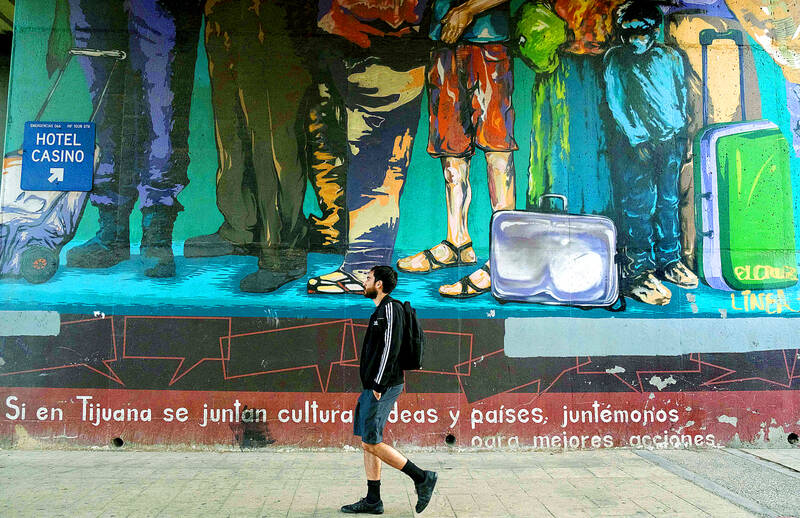While many migrants risk their lives chasing the American dream, Gabriel Zarate fled the rising cost of living in California and moved to the Mexican border city of Tijuana.
The 38-year-old Chilean-American crosses over to work in San Diego, California, as an English teacher during the day and returns home in the evening to Mexico.
“One of the biggest reasons is the cost of living in Tijuana. It’s significantly cheaper than in California,” Zarate said.

Photo: AFP
Also, “I love Mexican people and food,” he added.
His neighbor and fellow English teacher Mike Rachfal also made the move from San Diego, where he used to pay US$1,275 per month to rent a studio.
“Here it’s about half that,” the 36-year-old said.

Photo: AFP
The cheaper rents can be a sensitive subject in Mexico, where wages are much lower than in the US and people are also facing increasing living costs.
Tijuana is one of the cities with the fastest-rising real estate prices in Mexico — up 10.7 percent in the first quarter of the year from a year earlier, data from the state-owned Federal Mortgage Society showed.
The average price of properties bought by US citizens is about US$270,000 — “three times lower than what the same property would cost in the United States,” said Ruth Sastre, president of the local realtors association.
In Tijuana, a bustling city with a reputation for gang violence, new apartment buildings are springing up with “For Sale” signs in English and prices in dollars.
With more than 1,000 murders in the city already this year, security is an important consideration, but Zarate said that “in general I feel fine in Tijuana, especially downtown or around the border.”
“It’s like any big city. There will always be places rougher or more complicated than others,” he added.
It is a similar story just south of Tijuana in Rosarito on the Pacific coast.
Following a real-estate boom that began a decade ago, up to about 12,000 people from the US now live in the resort city, said Jesus Rincon Vargas, president of the local construction industry association.
About 1.6 million US citizens are estimated to live in Mexico, according to the US embassy, which does not keep official records.
They can stay for up to six months with a tourist visa, or apply for residency.
Along with the lifestyle and cost of living, the relatively relaxed immigration rules are part of the appeal for remote workers flocking to Mexico, notably the capital.
Brian McDonald, a 34-year-old software developer from Oklahoma, has spent more than a year in the Latin American country, lured by its budding technology scene.
“Mexico City seems like it’s kind of a gateway for expanding companies and I like working with start-ups,” he said.
“It’s a very friendly culture,” he added.
Office-sharing company WeWork has seen a “significant influx of digital nomads” in districts of Mexico City popular with foreigners, company spokeswoman Cristina Sancen said.
“Mexico City has an incomparable climate. For foreigners, it’s definitely a cheaper city. It’s also a cosmopolitan and highly developed city with start-ups and corporations,” she added.
Some foreigners working for US firms are also choosing to base themselves south of the border.
Kirsty Hall, 23, from Scotland, picked Mexico City as a remote working location while helping to set up a San Francisco-based tech start-up.
“I can walk everywhere here. I can cycle. Today I roller-skated to work. Public transport is awesome and it’s very cheap. People are very welcoming too,” Hall said.
The influx of foreigners has divided opinion among residents of the capital, some of whom see the city’s popularity as one of the reasons behind gentrification and rising rents.
“I heard there’s some prejudice towards digital nomads within Mexico City but I haven’t experienced it personally,” said Blazej Mosinski, 23, from Poland, who is doing a San Francisco internship remotely “purely for financial reasons.”
Other challenges of working remotely in Mexico include slower Internet speeds than in US technology hubs and safety concerns.
“I was robbed by the police two weeks ago, just walking home,” McDonald said.
However, “the rest — the good food, the cost of living — offsets all of those things,” he added.

In the sweltering streets of Jakarta, buskers carry towering, hollow puppets and pass around a bucket for donations. Now, they fear becoming outlaws. City authorities said they would crack down on use of the sacred ondel-ondel puppets, which can stand as tall as a truck, and they are drafting legislation to remove what they view as a street nuisance. Performances featuring the puppets — originally used by Jakarta’s Betawi people to ward off evil spirits — would be allowed only at set events. The ban could leave many ondel-ondel buskers in Jakarta jobless. “I am confused and anxious. I fear getting raided or even

Kemal Ozdemir looked up at the bare peaks of Mount Cilo in Turkey’s Kurdish majority southeast. “There were glaciers 10 years ago,” he recalled under a cloudless sky. A mountain guide for 15 years, Ozdemir then turned toward the torrent carrying dozens of blocks of ice below a slope covered with grass and rocks — a sign of glacier loss being exacerbated by global warming. “You can see that there are quite a few pieces of glacier in the water right now ... the reason why the waterfalls flow lushly actually shows us how fast the ice is melting,” he said.

Eleven people, including a former minister, were arrested in Serbia on Friday over a train station disaster in which 16 people died. The concrete canopy of the newly renovated station in the northern city of Novi Sad collapsed on Nov. 1, 2024 in a disaster widely blamed on corruption and poor oversight. It sparked a wave of student-led protests and led to the resignation of then-Serbian prime minister Milos Vucevic and the fall of his government. The public prosecutor’s office in Novi Sad opened an investigation into the accident and deaths. In February, the public prosecutor’s office for organized crime opened another probe into

RISING RACISM: A Japanese group called on China to assure safety in the country, while the Chinese embassy in Tokyo urged action against a ‘surge in xenophobia’ A Japanese woman living in China was attacked and injured by a man in a subway station in Suzhou, China, Japanese media said, hours after two Chinese men were seriously injured in violence in Tokyo. The attacks on Thursday raised concern about xenophobic sentiment in China and Japan that have been blamed for assaults in both countries. It was the third attack involving Japanese living in China since last year. In the two previous cases in China, Chinese authorities have insisted they were isolated incidents. Japanese broadcaster NHK did not identify the woman injured in Suzhou by name, but, citing the Japanese